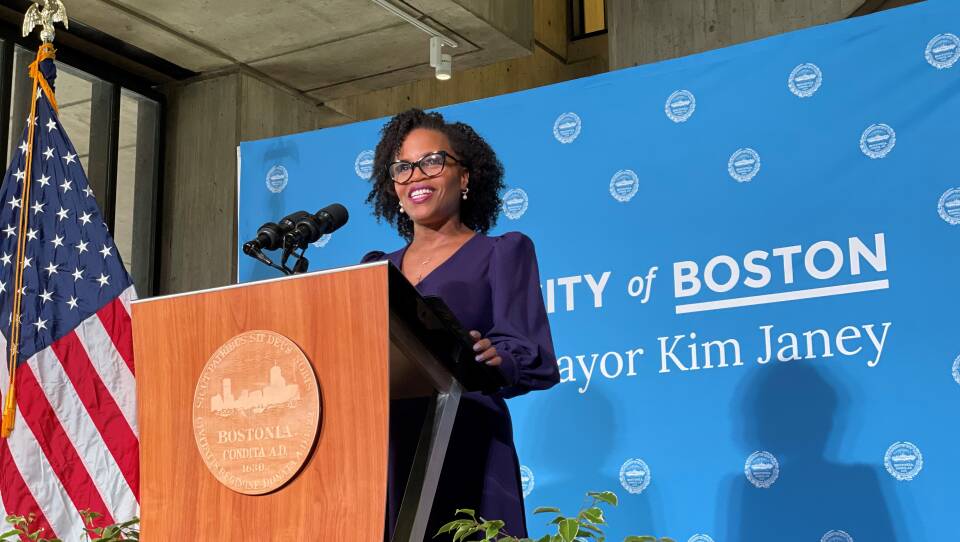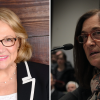For anyone who’s been watching the 2021 Boston mayoral race closely, Kim Janey’s announcement that she’s joining the contest was no surprise. Ever since Janey became acting mayor on March 22— as city-council president, she automatically took over when former Mayor Marty Walsh resigned — she’s sent strong signals that she wants to run the city on a permanent basis. Among other things, Janey has not been shy about fundraising and worked to ditch the “acting” asterisk, even though Boston’s city charter clearly identifies that as her current role.
Still, Janey’s announcement is a major inflection point. After two weeks in which she was celebrated locally and nationally as the first woman and person of color to lead Boston, she now becomes the most recent entry in a six-person field. That, in turn, could change the way the press and her political rivals engage with her — though right now, the other candidates still seem to be weighing how to respond to Janey’s political honeymoon and pseudo-incumbency.
Case in point: at-large City Councilor Michelle Wu, who announced her own mayoral candidacy back in September 2020, before any other candidate and when it still seemed likely Walsh would seek reelection this fall. When Janey first became acting mayor, Wu tweeted her congratulations on that historic accomplishment — omitting the “acting” label and saying she looked forward to working with Janey during a critical period.
On Tuesday, after Janey announced her candidacy, Wu spoke of history again. This time, though, she focused on the mayoral field as a whole, casting Janey as one part of a pathbreaking group of equals.
“I’m excited to see this field of historic candidates representing Boston’s diversity and a huge range of expertise and talent and qualifications,” Wu said.
Asked how she’ll campaign against a rival who’s effectively asserted that she already has the job, Wu offered a measured response, focusing on her own campaign rather than the transitional nature of Janey’s role.
“I was the first candidate to jump into this race, in a very different political situation then,” Wu said. “What I’ll say is, whether there’s a two-term incumbent or a two-month incumbent in this field, it doesn’t change how we run our campaign. We’re focused on organizing in every neighborhood, with the strongest track record and the boldest ideas. We’re building a multigenerational, multicultural, multiracial coalition to meet this moment in Boston.”
John Barros, who served as Walsh’s economic-development chief, also seems to be calculating how forcefully to engage Janey. On Monday, when Janey unveiled a new Boston tourism campaign aimed at highlighting the city’s neighborhoods of color, Barros tweeted that he designed the campaign in question — implying that Janey was taking credit where none was due.
After Janey’s announcement, though, Barros — like Wu — hailed Janey as part of a trailblazing group, saying, “I’m proud to be in a field of such diverse candidates. It says a lot about our city. It says a lot about how far Boston has come.”
Asked how he’ll run against a candidate who’s portraying herself as the de facto incumbent, even though she hasn’t yet been elected, Barros, too, focused on his own campaign instead.
“I run on my record,” Barros said, citing his leadership of the Dudley Street Neighborhood Initiative, his tenure on Boston’s school committee, and his work in the Walsh Administration. “I believe that that record stands on its own, and that that experience is the kind of experience that Boston needs today.”
District 4 City Councilor Andrea Campbell was the second candidate, after Wu, to enter the mayoral race, also in September 2020. Following Janey’s announcement, Campbell offered a brief word of welcome and then — almost immediately — shifted to the campaign pitch she’s been making for months.
“I congratulated my former council colleague on her decision to run — but for me, it was never about who was in the seat or who would get into this race,” Campbell said.
“I jumped into this race back in September because I knew the urgency and opportunity for new leadership that would not only bring our city together, but would be courageous enough to take on and confront our painful history of racism and division, and to do the really hard work of eradicating the inequities that exist in this city,” Campbell added. “And I still believe I am the best candidate to do just that.”
In a statement emailed by a spokesperson, state Rep. Jon Santiago, D - Suffolk, the fourth candidate to enter the race, said Janey “has made history for our city that we can all be proud of.”
“As we confront this urgent moment … the more voices we have at the table, the better,” he added.
When asked about the challenges of facing an acting mayor, Santiago said, "Throughout this campaign, we're going to have important conversations about how we write the next chapter of our Boston story. ... I'm excited to bring my own experiences as an ER physician, captain in the Army Reserve and as an advocate for Boston in the House of Representatives to that conversation."
At-large City Councilor Annissa Essabi George, who announced her candidacy in January, also provided a statement through a spokesperson, saying of Janey, “ I welcome her entry into the race. I’ve had the privilege of serving alongside her on the Boston City Council and know we share a deep love for the city of Boston and commitment to its future.”
Like her fellow candidates, Essaibi George chose not to directly address Janey’s electoral advantages, saying only, “As I have done since I announced … I will continue to make the case to this city that I’m the leader for this moment and run on my record, my experiences and my vision for a stronger, more just, more resilient Boston.”





